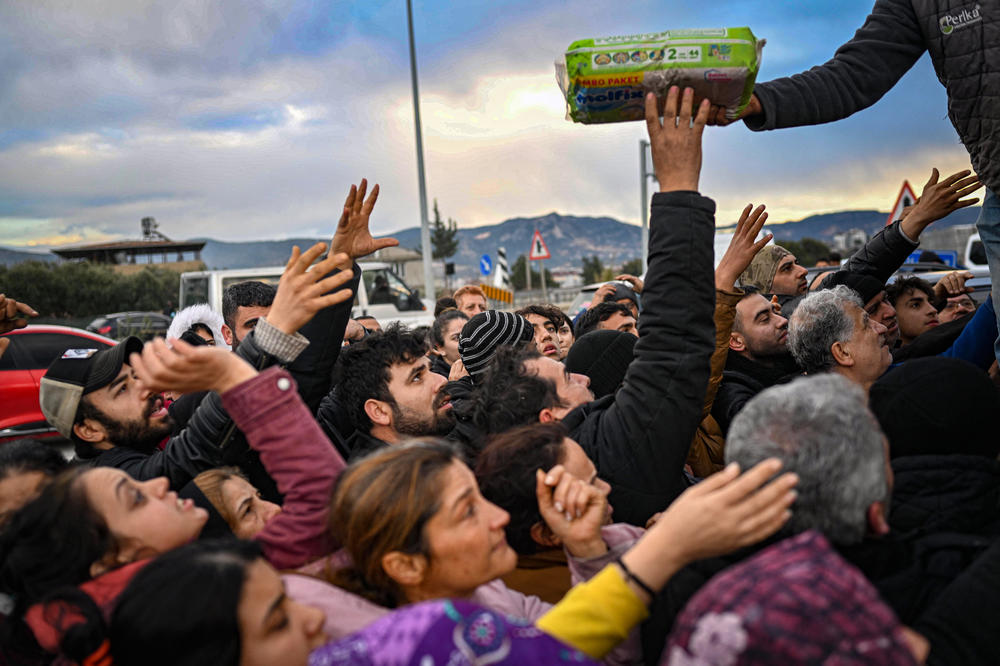Section Branding
Header Content
How to make sure your donation will do the most good for earthquake survivors
Primary Content
The devastating scope of death and destruction caused by the 7.8 magnitude earthquake that struck southern Turkey and northern Syria on Feb. 6 continues to unfold. And people around the world are eager to help. How do you ensure that your donations will make the most difference?
These are the guidelines suggested by three experts in humanitarian aid.
Start with due diligence.
Giving right away is important for immediate needs, says Ruth Messinger, a social justice consultant who formerly headed the American Jewish World Service. But, she emphasizes, "Never give to a brand new charity that does not have a track record." To find out more about an organization's track record, there are several resources, including Charity Navigator (which has posted on its website a dedicated list of highly-rated charities poised to help in the current crisis), the Center for Disaster Philanthropy and CharityWatch.
Also take a look at an organization's annual report. It should be found on their website (and if not, ask why not). The report should tell you how they responded to past emergencies and crises.
Make sure the charity is situated to help in this emergency.
"First and foremost, prioritize giving to established organizations and non-profits that have a presence in the area prior to the disaster so they are ready to act," advises Amanda Morgan, Save the Children project officer for humanitarian private fundraising.
And whenever possible, go local, adds Cindy Huang, senior fellow at the Center for Global Development, who previously worked at Refugees International. Do so by contributing to either local organizations staffed or overseen by those in the affected areas — or to larger organizations that have a history of partnering and working closely with the communities and groups in the immediate area. "Established presence is more than just having an office in the country; it's established relationships with local organizations and the trust of the community," she says. Partnerships between local and international groups should be spelled out on the check the group's website or annual report.
Huang's experience working in previous humanitarian crises showed her, she says, "the critical importance of elevating local leadership in the response. Those are the people who will remain to rebuild and work to create resilient communities in the present and for the future."
Any red flags to watch out for before donating?
Perhaps most obvious, you should get a receipt for your donation for tax purposes; if you don't receive one, something's amiss. Also beware of potential scams: asking you to send money to a personal bank account; sketchy social media campaigns; websites that seem incomplete, lacking budget rundowns or essential information about how the organization works and what it does.
Can or should you donate your contribution for a specific type of aid?
For humanitarian disasters like this, giving flexibly is the best way, says Morgan of Save the Children. Not having funds tied to any specific activity area allows the organization to respond to immediate and changing needs. "And that's the point. Things change hour to hour and that's why those funds need to be flexible," she says.
If you are keen providing aid of a particular kind — medical aid or food, for instance — look for humanitarian organizations that specialize in those areas.
What if I want to send material goods like clothing or toys?
All three experts emphasize: Give cash! Says Messinger: "Especially after an earthquake there is no reliable way to get any [specific items] to people. You're doing the vetting to make sure that the organization you give to will use the money efficiently to get what's need to the people who need the food, clothing and help they need."
How can I help over the long haul?
"There was a humanitarian crisis for many of these communities pre-earthquake, and this crisis has put them into a deeper crisis," says Morgan. That means that recovery is going to take a long time, she says, with long-term needs for shelter, health, education, protection and what's known as "WASH" — water, sanitation and hygiene. There's also need for psycho-social support for the different traumas the population has experienced. That is why it's important to "make sure you are looking at organizations that are going to stay involved for the long term," she says.
Huang adds a further thought: "Giving often surges when there is a humanitarian event or disaster in the news," she says. But the need for help won't go away once the earthquake fades from the headlines. In the weeks and months ahead, there will still be a need for aid — and for donations.
Diane Cole writes for many publications, including The Wall Street Journal and The Washington Post, and is book columnist for The Psychotherapy Networker. She is the author of the memoir After Great Pain: A New Life Emerges. Her website is DianeJoyceCole.com.
Copyright 2023 NPR. To see more, visit https://www.npr.org.

